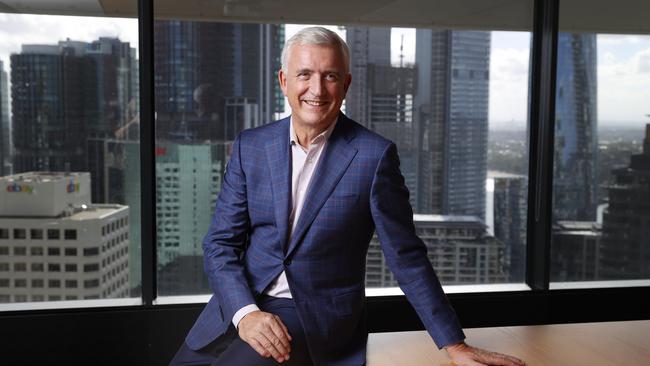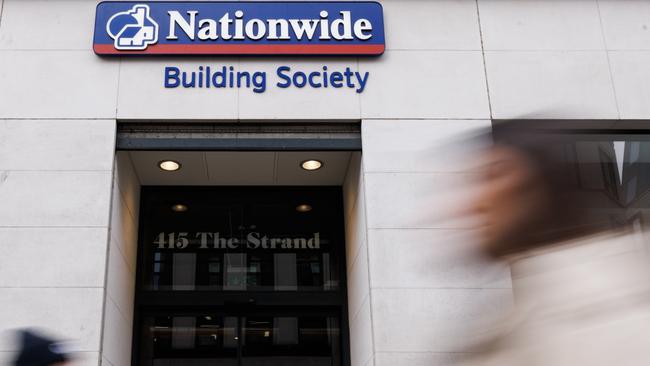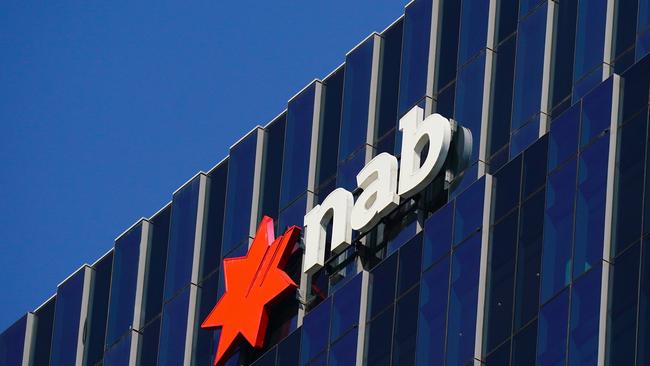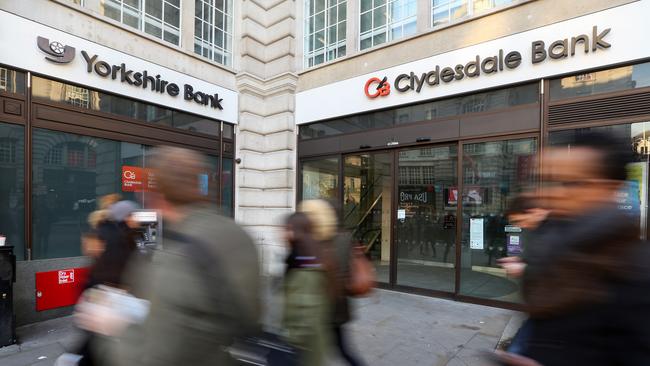
For the first time, the number of London-listed Virgin Money shares outnumbered shares listed on the ASX, even if it was by a fraction – 50.1 per cent to 49.9 per cent.
A $290m buyback program from Virgin Money had the unintended effect of soaking up the “rump” of Aussie shareholders left over from National Australia Bank days. It was a moment in time which passed with little fanfare, although it looks to be another short-lived British win.
Weeks later Virgin Money got a $5.6bn takeover approach from acquisition-hungry building society Nationwide. The bid – equivalent to $4.27 per share – from the West Midlands rival was all cash and represents the biggest British banking deal since Covid.

And, with Virgin Money’s board surprisingly quick to give its endorsement, this is looking to be the last stop for tens of thousands of Australians who came along for the ride.
However, with a long-tail of Australian retail shareholders and big name investors like Allan Gray (10.2 per cent), Firetrail Investments (5.2 per cent) and AMP (3.3 per cent) the deal could yet be decided in Sydney and Melbourne, rather than Virgin Money’s headquarters at Newcastle-upon-Tyne.
The question is why Virgin Money is seemingly so eager to do a deal with Nationwide boss Debbie Crosbie at such a knockdown price. Virgin Money’s board has said “it would be minded to recommend the buyout” to shareholders. Under British rules Nationwide now has two weeks to either announce a firm offer or pull out of its intentions.
Virgin chairman David Bennett argues the deal represents “attractive value” and the Virgin Money business would benefit from Nationwide’s scale and ambition. The deal was pitched at a 40 per cent premium to Virgin Money’s three-month average share price.
However, with the British economy entering a recession in the December quarter of last year, the deal is stacked in favour of the cashed-up Nationwide. Quarterly results posted last month show the slowdown is biting, with lending losses, particularly in its credit card business, jumping sixfold.

The story of how tens of thousands of Australians have found themselves in the middle of a British regional bank buyout is due to National Australia Bank finally confronting what it should do with its long-underperforming British business.
NAB took the financial pain in 2015 with a demerger as it finally washed its hands of the bank built around Scottish brand Clydesdale which also included Yorkshire Bank.
The primary listing of Clydesdale was in London, although at the time Australian shareholders represented 75 per cent of the UK bank.
Even so, Clydesdale had been run hard under the ownership of NAB. It had been under-invested as NAB bided its time, hoping to make a mega-UK acquisition.
To get a sense of the drama, it was during the 1990s one of the bank’s CEOs, Fred Goodwin, earned his nickname “Fred the shred”.
Goodwin later went on to oversee RBS, although his divide and conquer strategy unravelled as the banking major needed a massive government bailout during the Global Financial Crisis.
Clydesdale’s legacy can be traced to four separate regional UK banks, including two in Ireland, which were poorly mashed together, sitting together in uneasy alliance.
The Irish banks were sold in the early 2000s. Typical of NAB’s accident-prone decade, NAB found itself embroiled in the middle of the Northern Ireland peace process when its Belfast bank was the victim of a $50m heist, later linked to the IRA.
Clydesdale got a new lease of life after its London stock exchange listing, and with new swagger in mid-2018 bought out the Virgin Money business and modelled itself as a challenger brand.
It opted to keep paying Richard Branson for the licence to use the Virgin name, and Virgin deal gave Clydesdale the scale it needed with a combined 6.6 million customers.
Cyclic low
Just over a year ago, the bank’s CEO David Duffy told this column the combination with Virgin gave it the “size, scale and all the products” as well as the brand to take on the high street banks. His multi-year plan was for Virgin to be “the first legacy bank to become a purely digital bank”.
Before the Nationwide approach, Virgin Money was trading at a 33 per cent discount to the five-year average share price and a 57 per cent discount to the benchmark FTSE100, according to Macquarie numbers.
While Virgin is being crunched by the downturn, the major British banks are trading at a 47 per cent discount to the FTSE 100. With the deal in cash, Virgin Money shareholders won’t get any upside from their bank being part of a bigger lender, or the recovery in the economy there.

Virgin’s bankers could draw out a rival bid from NatWest or HSBC, but the chances are low. Both have their own issues and shareholders wouldn’t want further distractions. Bigger banks like Lloyds or Barclays are likely to hit competition hurdles. RBS still counts the British government as its biggest shareholder. The takeover also highlights the huge valuation gap between Australian and British banks. Prior to the approach, Virgin Money was trading on a price to earnings valuation of seven times current year earnings, which is right on average for British banks. Its price to net tangible assets was 0.56 times, a discount to the industry average of 0.8 times NTA.
Australian banks with a brighter growth outlook and more concentrated market command a relative global premium. Based on Macquarie calculations, the average price-to-earnings ratio of the big four is 16.3 times and price to net tangible assets a whopping 2 times. Even regional lender Bendigo trades at nearly two times the book value of Virgin. In other words, Aussie banks are expensive, making it a tougher call for the big shareholders in Virgin Money to switch into a local bank in lieu of the British recovery story.
Branson’s privately held Virgin Group, which holds 15 per cent of Virgin Money bank, has indicated it will accept the offer. Contractually, Nationwide would have to continue paying a licence fee to Branson for the use of the Virgin name for the next few years.
Under British scheme of arrangement rules, 75 per cent approval is needed. Australian investors have so far braved Brexit, Scottish independence and the IRA. They’ve come this far, so why rush to bail out now?
Nickel melts
Iron ore markets weren’t doing any favours for BHP boss Mike Henry as he fronted retail investors. After weeks of drifting, prices for the metal have finally slipped below the $US100 a tonne mark, representing a 25 per cent fall this year.
Beijing’s tepid National People’s Congress hasn’t been able to fire up the economy there, while there is a build-up in supplies.
But it is nickel that remains in serious trouble. Citi analysts have a base case forecasts, that is a 60 per cent probability, of nickel falling to $US15,500 a tonne over the next three months as Indonesia keeps pumping out supply.
Nickel is currently trading at $US17,900 and Citi sees the metal averaging $US16,250 this year and $US17,000 next year.

These numbers are important as BHP puts it entire Nickel West business in Western Australia under review with an eye to dramatically slash costs or even place the business under care and maintenance – essentially to freeze it in time. A decision on the review will be made “as soon as possible”, Henry told an investor Q&A. Care and maintenance is a “pretty weighty decision,” he added.
A month ago BHP took a $US2.5bn writedown for the Western Australian nickel business taking its valuation to zero with miner keeping a bearish view on the outlook of the metal and the state of the Australian market.
On pricing, Henry says Nickel West’s costs are sitting at about $US20,000 a tonne. “That means the business is losing cash”.
And at the same time, there’s a need for ongoing investment in the business just to keep it running effectively.
“On top of that, we’ve got the need for a major smelter rebuild coming towards us, which is many hundreds of millions of dollars in capital expenditure. So looking at all of that, we’ve said ‘okay, clearly this isn’t sustainable. It’s not the best use of funds for shareholders’”.
The aim of game for BHP is to preserve cash. Already some 30 per cent of the Australian nickel business has gone offline which has seen a small bounce in nickel prices from the sub-$US16,000 levels. Part of the complexity of the review is to consider how to restart the nickel business. If, as widely expected, BHP goes down the care and maintenance path it will need a trigger price for the business to sustainably come back in coming years.
BHP has already started to pause work on the $1.7bn West Musgrave nickel and copper project it inherited from Oz Minerals with nearly 100 contractors being phased down. Citi says the nickel market is for surpluses remain our base forecast for the overall nickel market all the way out to 2028, although there is a bright spot with China expected to boost demand given bigger-than-expected stainless steel and nickel alloys production.
johnstone@theaustralian.com.au





An upstart British bank last month passed a major milestone.